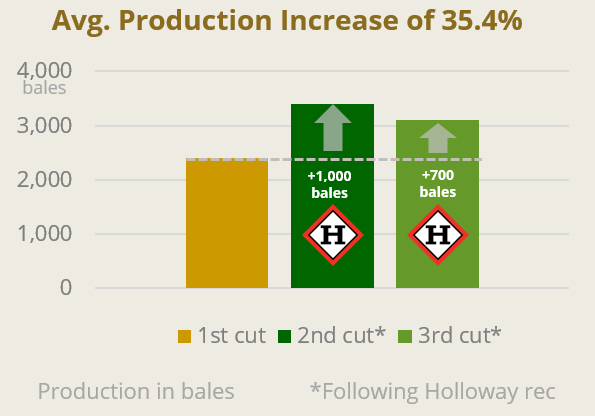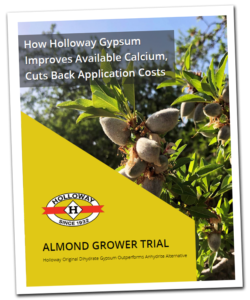June is here, which means the temperatures are starting to soar and crop production and irrigations are in full swing.
To combat the water infiltration, compaction and sodium and calcium issues we oftentimes see this time of year, we recommend row and field crop growers combat harsh soil conditions with a quick gypsum application that helps improve irrigation water infiltration for the conditions described above.
Mid-Season Improvements in Alfalfa
 In alfalfa, for example, which removes large quantities of nutrients from the soil each year, a gypsum application can help improve mid-season deficiencies that reduce yield, quality and stand life.
In alfalfa, for example, which removes large quantities of nutrients from the soil each year, a gypsum application can help improve mid-season deficiencies that reduce yield, quality and stand life.
For example, a mid-season amendment program from Holloway helped Tom Sandrini increase production by an average of 35.4%, improving production from 2,400 bales on a first cutting to 3,400 and 3,100 bales over the next two cuttings post application.
Sandrini estimates production increased to about 2.5 to 3 tons per acre due to Holloway agronomy team’s soil testing and recommendations, a tailored amendment program of gypsum-sulfur, compost, and macro- and micronutrients.
Additional Benefits in Other Crops
Improving Calcium Uptake in Tomatoes, Fruit
Gypsum helps make nutrients such as calcium more available to tomatoes and other crops, where high amounts of Calcium need to be sustained. Our trials have indicated Holloway gypsum maintains Calcium better than competitor products.
Gypsum is calcium sulfate dihydrate, which means each molecule of calcium sulfate has two water molecules associated with it. It is expressed as CaSO4 (2) H2O. Calcium sulfate dihydrate reacts quickest in the soil as the attached water molecule in the mineral works to drastically increase solubility. Anhydrite or hemihydrate will also provide similar benefits as gypsum, but on a significantly slower time schedule that won’t significantly improve soil and crop health for this season.
Easing Compaction Issues in Carrots
After a field has been developed, it can become tricky to reverse the impact of compaction issues without an application of gypsum.
When soil particles become compressed together, due to compaction, it can affect water holding capacity, nutrient uptake, and make growing conditions extremely difficult for root vegetables such as carrots.
Compaction issues have historically stunted the growth of carrots and negatively affected yield without a proper in-season soil management program.
Gypsum can help break up compacted soil and decrease penetrometer resistance. The compaction in many soils can be decreased with gypsum, especially when combined with deep tillage to break up the compaction. Combining gypsum with organic amendments also helps, especially in preventing compaction come harvest time and in future seasons.
Contact Holloway today to learn more about our agronomy, soil amendment and spreading services.
Join Over 800 Companies Using Holloway Today.
Or Become Part of The Holloway Group to Further Your Career.


